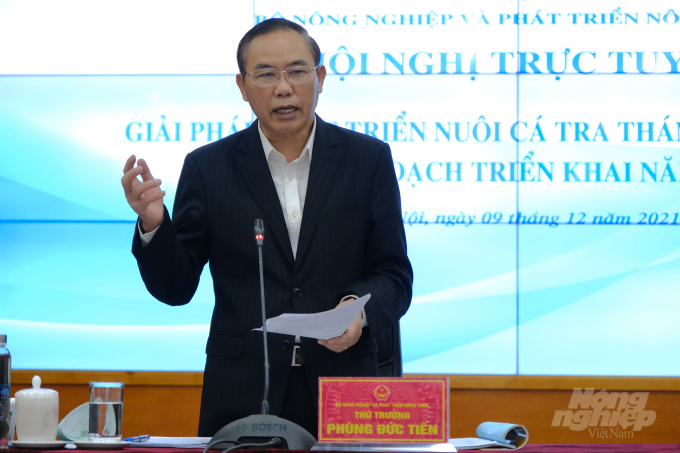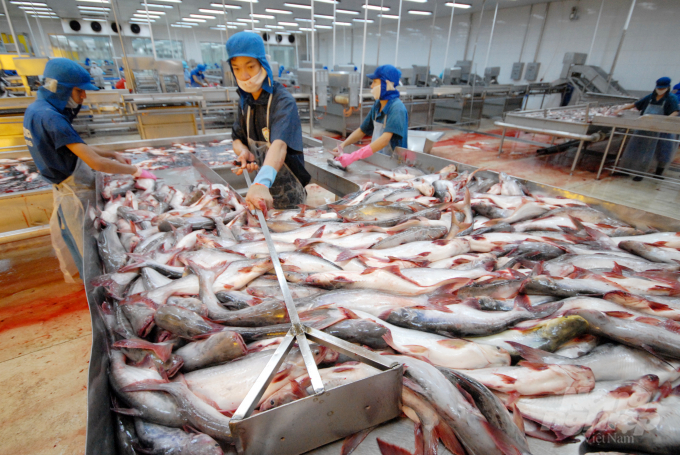May 31, 2025 | 02:37 GMT +7
May 31, 2025 | 02:37 GMT +7
Hotline: 0913.378.918
May 31, 2025 | 02:37 GMT +7
Hotline: 0913.378.918

Deputy Minister of Agriculture and Rural Development Phung Duc Tien addresses the meeting on catfish industry development on December 9. Photo: Đức Minh.
In 2021, the seafood industry in general and the catfish industry in particular faced difficulties and challenges. The price of catfish raw material dropped to a low record since 2019, affecting production and investment. The COVID-19 pandemic has also affected catfish production and consumption chains.
In the Mekong Delta provinces, due to the long social distancing from July to September 2021, production and transportation of breeding, feed and raw fish were affected. Many farming establishments lack harvesters, several feed factories and catfish processing factories had to temporarily suspend operations or reduce their capacity. Production costs have increased, potentially leading to a potential shortage of raw materials for export processing while international transportation was disrupted.
Despite the difficulties, the Ministry of Agriculture and Rural Development and the Directorate of Fisheries promptly implemented many practical activities. As a result, aquaculture production this year maintained growth with aquaculture output for the whole year 2021 reaching an estimated 4.75 million tons, up about 4.17 per cent compared to 2020. Catfish production reached about 1.5 million tons, equal to that of last year. Catfish export turnover is estimated at over US$1.5 billion.
Speaking at an online conference on solutions for catfish farming development on December 9, Deputy Minister of Agriculture and Rural Development Phung Duc Tien said that specific, synchronous and timely solutions were needed to develop catfish farming, both ensuring food quality and safety for consumer demand in the last month of 2021 and ensuring enough raw materials for processing in the first months of 2022, thus, achieve the growth target.
Catfish is a key commodity, an endemic product of the Mekong Delta region, and plays an important role in the socio-economic development of the whole region. Based on the results achieved in 2021, the pangasius industry still set ambitious goals for next year including a breeding area of over 5,200ha, commercial catfish output of over 1.7 million tonnes and export turnover of over US$1.6 billion.

Catfish is a key commodity, an endemic product of the Mekong Delta region. Photo: Le Hoang Vu.
Huynh Tat Dat, Deputy Director of Dong Thap Province Department of Agriculture and Rural Development, said that from the social distancing period, the province paid more attention to improving quality and domestic market.
He mentioned the fact that the main catfish product was a fillet. He asked the Department of Agricultural Product Processing and Market Development to have more guidance to help the localities create more multi-valued products such as collagen and fish oil.
Another problem was that many local breeding production facilities paid more attention to quantity rather than the quality of the output, he said.
Day also asked the Directorate of Fisheries to act as the focal point for localities and businesses in drawing the catfish industry development planning in the coming time.
To overcome the difficulties caused by the COVID-19 pandemic, restore production and business activities of the industry, Deputy Minister Phung Duc Tien suggested six main solutions.
Firstly, the People's Committees of the provinces in the Mekong Delta must strictly implement the Law on Fisheries and guiding documents relating to infrastructure, product quality management and quality certificates, inspection and handling violations.
"Provinces need to have appropriate mechanisms and policies to develop farming areas associated with processing and consuming establishments to share information and regulate production according to the requirements of the market," the Deputy Minister shared.
In addition, Tien suggested that the Mekong Delta provinces continue to implement the project " Three-level linkage in high-quality catfish breeding production in the Mekong Delta", especially Dong Thap province. He expected that localities would urgently implement Government’s policies on supporting producers affected by COVID-19 such as electricity price reduction, loans with preferential interest, taxes, fees, and insurance. Authorities support businesses and farmers in maintaining breeding production, feed, farming and processing to ensure the stability of the catfish production chain, good quality control and food safety.

Ministry of Agriculture and Rural Development hold an online meeting on December 9, discussing solutions for catfish industry development. Photo: Bao Thang.
Second, the Deputy Minister assigned the Department of Animal Health to strengthen disease control and share information with the Directorate of Fisheries and the localities in the Mekong Delta.
Third, the Department of Agriculture, Forestry and Fisheries Quality Control are responsible for controlling the quality and food safety of catfish farming areas, especially farming areas that supply raw materials for export to the US, share residue testing results with the Directorate of Fisheries to solve issues to meet quality requirements.
Tien directed the department to take necessary measures to reopen the Saudi market for catfish products.
Fourth, Tien assigned the Agricultural Product Processing and Market Development Department to regularly update market developments, promptly advise and share information with units, businesses and farming establishments to have a suitable production plan.
Fifth, associations, businesses, production and business establishments in the catfish industry chain actively develop scenarios to respond to the COVID-19 pandemic based on information and guidance from the health sector.
It was also necessary to have branding and adaptive strategy for long-term and sustainable development.
Sixth, businesses and farming establishments need to Diversify their products that are convenient for consumption, suitable for family meals and market segmentation.
They should further promote e-transactions in the context of the pandemic, comply with regulations on the use of chemicals and antibiotics in catfish farming, improve product quality, implement traceability, prepare well internal resources to take advantage of opportunities to export catfish to the EU market, especially when related tax lines were reduced thanks to the EVFTA agreement.
Tran Dinh Luan, Director of the General Department of Fisheries under Ministry of Agriculture and Rural Development suggested that localities, associations and enterprises focus on solving three problems to create momentum for the last month of this year. Firstly, it is necessary to create a stable and quality breeding source. Secondly, catfish value chains need to be expanded. Thirdly, obstacles that occurred during the implementation of Government’s Resolution 128 must be reported and addressed timely.
"The industry has faced many difficulties this year. From the central to local levels, all have focused on reviewing the catfish supply before proposing technical solutions to help increase profits for catfish growers", Luan said.
Translated by Hien Anh
/2025/05/29/5625-12-214801_567.jpg)
(VAN) Provincial mergers in the Mekong Delta promise to streamline administration, expand inter-provincial raw material areas, and foster close linkages in agricultural value chains, benefiting both businesses and cooperatives.

(VAN) Merging Mekong Delta provinces contributes to the expansion of agricultural raw material areas, addressing previous constraints caused by provincial boundaries. Additionally, this expansion will reduce costs and strengthen linkages between businesses, cooperatives, and farmers.
/2025/05/29/1043-2-153730_145.jpg)
(VAN) The Government's policy to merge provincial-level administrative units opens up major opportunities for the Mekong Delta region to reshape its agricultural development strategy toward large-scale production, effective regional linkages, and sustainability.

(VAN) The mutual export of agrifood products between the European Union (EU) and the United Kingdom (UK) must occur again without certification, border controls or other red tape. This was agreed at the UK-EU summit.
/2025/05/22/5121-2-173645_677.jpg)
(VAN) NBSAP Tracker identifies strengths and areas for improvement in the National Biodiversity Strategy, based on each region’s priorities and capacities.

(VAN) The draft amendment to the Circular on rice export trading stipulates a periodic reporting regime for rice exporting enterprises.

(VAN) Dong Thap farmers attained an average profit margin of 64% during the summer-autumn 2024 crop (first season), while An Giang and Kien Giang farmers followed with 56% and 54%, respectively.